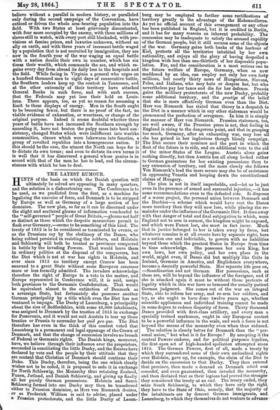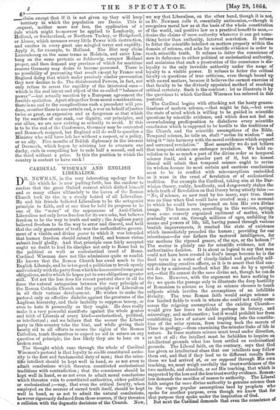THE LATEST RUMOUR.
HINTS of the basis on which the Danish question will ultimately be solved are appearing in many quarters, and the solution is a disheartening one. The Conference is to be used, as we predicted from the first, as a machine for legalizing the exercise of force, and Denmark is to be stripped by Europe as well as Germany of a large section of her dominion. The new plan, so far as it can be discerned under the slight and scattered gleams of information vouchsafed to the " self-governed " people of Great Britain,—gleams not half so distinct as those which the despotic monarchies permit to flash over Germany,—seems to be something of this kind. The treaty of 1852 is to be considered as terminated by events, or as the Prussians say by the obstinacy of the Danes, who being robbed persisted in resisting the robbers, and Holstein and Schleswig will both be treated as provinces conquered in battle by the invading Powers. That would leave them in ordinary polities at the disposal of the conquerors, but the Diet which is not at war has rights in Holstein, and ever since 1815 no territory except Cracow has been annexed to a great State without some European consensus more or less formally admitted. The invaders acknowledge therefore the right of Europe to a vote in the matter, and Europe represented in Conference will, it is said, assign 'both provinces to the Germanic Confederation. That would be equivalent almost to the extinction of Denmark as a sovereign State, but fortunately she possesses another German principality by a title which even the Diet has not ventured to impugn. The Duchy of Lauenburg, a principality about the size of Bedfordshire, with some 46,000 inhabitants, was assigned to Denmark by the treaties of 1815 in exchange for Pomerania, and it would not suit Austria to tear up those treaties or Prussia to surrender her quid pro quo. The Diet therefore has even in the thick of this contest voted that Lauenburg is a permanent and legal appanage of the Crown of Denmark, and that the change of succession involve no breach of Federal or Germanic rights. The Danish kings, moreover, have, we believe through their influence over the proprietors, succeeded in conciliating the little Duchy, and the Estates have declared by vote and the people by their attitude that they are content that Christian of Denmark should continue their Duke. This Duchy, therefore, being the one -which clearly wishes not to be ceded, it is proposed to cede it in exchange for North Schleswig, the Monarchy thus retaining Zealand, Funen, Jutland, and Danish Schleswig, and giving up finally all her purely German possessions. Holstein and South hleswig formed into one Duchy may then be transferred either to Prussian dominion, as Herr von Bismarck desires, or as Frederick William is said to advise, placed under a Prussian protectorate, and the little Duchy of Lauen- burg may be employed to farther some rectifications of territory greatly to the advantage of the Hohenzollerns. As yet no official account of this arrangement or any other has been published in England, but it is credited in Berlin, and it has for many reasons an inherent probability. The concession may be inadequate to satisfy the aroused cupidity of the German people, but it still secures some of the objects of the war. Germany gains both banks of the harbour of Kiel, protects all the territories inhabited by her own nationality, and enjoys all the glory of having despoiled a kingdom with less than one-thirtieth of her disposable popu- lation. For, and the consideration is a most serious one to the future welfare of Europe, Germany, when as now maddened by an idea, can employ not only her own forty millions, but nearly thirty more of Hungarians, Slavons, Poles, and Italians, who may hate or despise her, but who nevertheless pay her taxes and die for her defence. Prussia gains the military protectorate of the new Duchy, probably some additional territory, and the prestige of the belief that she is more effectively German even than the Diet. Herr von Bismarck has stated that theory in a despatch to the Diet in a manner which in any other statesman would be pronounced the perfection of arrogance. In him it is simply the manner of Herr von Bismarck. Prussian statesmen, too, are well aware, if the Prussian press is not, that feeling in England is rising to the dangerous point, and that in grasping too much, Germany, after an exhausting war, may lose all she has gained in her inglorious though bloody campaign. The Diet secure their nominee and the port in which the fleet of the future is to ride, and an additional vote to the aid of the minor States of the League. Austria alone gains nothing directly, but then Austria has all along looked rather to German guarantees for her existing possessions than to any extension of territory, and the more closely she follows Von Bismarck's lead the more secure may she be of assistance in oppressing Venetia and keeping down the constitutional claims of Hungary.
The plan is not in itself improbable,. and—let us be just even in the presence of armed and successful injustice,—it has some recommendations even to the defeated side. It disposes of a worse project, the personal union between Denmark and the Duchies—a scheme which would have cost the Danes more territory than they will now lose, while placing the re- mainder under the influence of the Germanic Diet. It does away with that danger of total and final subjugation to which, were England not to arm in earnest, the kingdom might be exposed, and which were Funen lost, she must in fact incur. Much that in justice belonged to her is taken away by force, but whatever remains is at all events hers by separate right, hers as a nation one and indivisible, to govern with no liabilities beyond those which the greatest States in Europe from time to time acknowledge. She possesses her own King, hor own laws, her own policy, and her own place in the world, might even, if Danes did but multiply like Celts in Ireland, Germans in America, and Englishmen everywhere, become a decently powerful State. Her separate life goes on, —Scandinavian and not German. Her possessions, such as these are, will be beyond the influence of the foreigner, and if she is attacked again it must be without those pretexts of legality which in this war have so bemused the usually patient German judgment. She comes out of the war an integral State, able to reform her army, and re-arm her soldiers, and try, as she ought to have done twelve years ago, whether scientific appliances and individual training cannot be made in some degree to redress disparity of force. Thirty thousand Danes provided with first-class artillery, and every man a specially trained marksman, ought in any European contest to be a powerful influence in the scale, and such a force is not beyond the means of the monarchy even when thus reduced.
The solution is clearly better for Denmark than the "per- sonal union," but what is it for Europe ? By accepting it the neutral Powers endorse, and for political purposes legalize, the first open act of high-handed spoliation attempted since 1815. The German Powers, first of all, made a treaty by which they surrendered some of their own undoubted rights over Holstein, gave up, for example, the claim of the Diet to decide on the succession to that Duchy. They then entered that province, then made a demand on Denmark which wad, conceded, and even guaranteed, then invaded the monarchy, and then declared that as their legions had proved the stronger they considered the treaty at an end. The treaty ended, they seize South Schleswig, to which they have only the right they have to the State of Ohio, namely, that the majority of the inhabitants are by descent German immigrants, and Lauenburg, to which they themselves do not venture to advance claim except that if it is not given up they will keep territory in which the population are Danes. This is dnquest, neither more nor less, the application of a tale which might to-morrow be applied to Lombardy, or Holland, or Switzerland, or Northern Turkey, or Heligoland, or Alsace, which menaces every little Power with destruction, and excites in every great one mingled terror and cupidity. Apply it, for example, to Holland. The Diet may claim Luxembourg on the same terms as Holstein, and enter Lim- burg on the same pretexts as Schleswig, conquer Holland proper, and then demand any province of which for maritime reasons Germany may desire to become possessed. There is no possibility of preventing that result except by France and England doing that which under precisely similar provocation they now decline to do. The disinterested Powers, in fact, not only refuse to arrest the cupidity of the interested ones— which is the real intent and object of the so-called "balance of power"—bat actually sanction by a European agreement the forcible spoliation. Apart altogether from moral considerations, there is no end to the complications such a precedent will pro- duce, orrather there is one certain end, a war on behalf ofjustice twice as great, as expensive and as dangerous as that which by the sacrifice of our rank, our dignity, our principles, and our allies, we are now striving so ardently to avoid. If this is to be the end of the Conference, Germany may be contented and Denmark resigned, but England will do well to question a Minister who will have left her without a respect, or a policy, or an ally. Five months of British diplomacy in the interest of Denmark, which began by advising her to evacuate one duchy, ends in compelling her to cede half a second, and sell the third without a price. Is this the position to which the country is content to have sunk ?

































 Previous page
Previous page